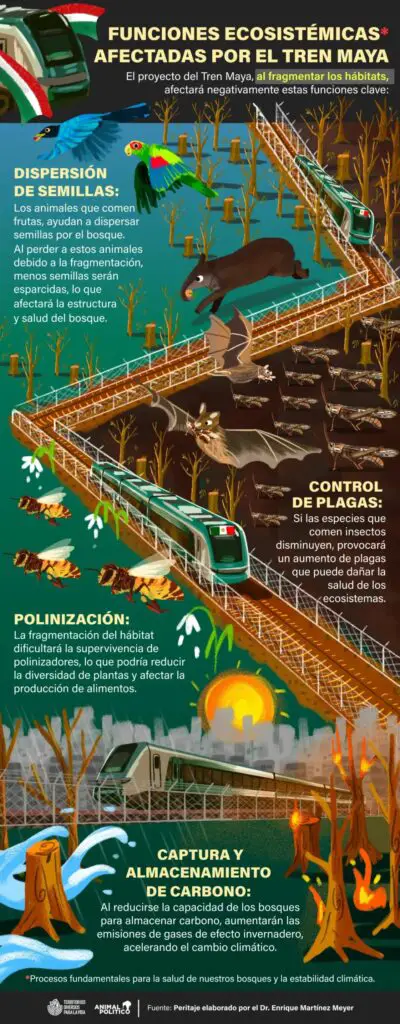A recent study conducted by researchers from the National Autonomous University of Mexico (UNAM) warns that the operation of the Tren Maya may significantly increase the vulnerability of the Yucatán Peninsula to extreme climate events, such as hurricanes and droughts. Experts in biological conservation and ecological restoration suggest that the construction of the train and associated tourism growth will have a devastating impact on the region’s ecosystem services.
According to the expert opinions presented by the organization Territorios Diversos para la Vida (TerraVida), between 2030 and 2050, food provision is expected to decrease due to biodiversity loss and ecosystem fragmentation. The abundance of pollinators, essential for agricultural production in the region, may also be drastically reduced.
The researchers point out that the Tren Maya has already had a negative impact on the peninsula, fragmenting and isolating populations of characteristic fauna, such as jaguars and tapirs. The construction of the train has also led to habitat loss for flora and fauna species.
Luis Zambrano González, an expert in wetlands and aquatic ecosystems, explains that ecosystem services in the region will be under pressure due to factors such as population growth, land use change, biodiversity loss, and urban expansion.
“Ecosystem fragmentation occurs when natural landscapes are divided into smaller areas by some activity,” explains Zambrano. “Scientific studies have shown that fragmenting an ecosystem leads to habitat loss for plant and animal species, and affects connectivity between populations.”
The expert also warns that the construction of the Tren Maya and subsequent land use change will have a significant impact on food provision in the region. The decrease in pollinator abundance, due to natural habitat loss, will affect agricultural production in the region.
“Pollination is a major problem,” comments Zambrano. “It’s the basis of agricultural production. We’re losing much capacity to rely on ecosystem services, which are based on insects and bats that, with the Tren Maya, will be greatly reduced, especially in the southern part.”

The study also highlights the loss of carbon sequestration capacity due to deforestation and ecosystem fragmentation; damage to pollination services; alteration of critical habitats for endemics and endangered species; as well as vegetation cover loss.
Viridiana Maldonado, a TerraVida attorney, warns that it is not necessary to wait to observe the impacts on the Yucatán Peninsula, as the project has been in operation since December 2023, and effects are already visible in surrounding communities.
“The presence of the train and increasing presence of the National Defense Secretary (SEDENA) have changed community daily dynamics,” explains Maldonado. “The fear is much greater because it’s not the same to face a national or international company as to face the State, at either state or federal level.”
The study also highlights the loss of ecosystem services in the peninsula, including food provision, water, and carbon sequestration. Researchers warn that the construction of the Tren Maya and associated tourism growth will have a devastating impact on ecosystem services in the region.
“The technology helps us do all this type of analysis to say that this has a greater cost over time because it will reduce the benefits of ecosystem services on which the train and tourism depend to survive,” says Zambrano. “As water, carbon sequestration, or pollination, which is what feeds people who live there.”
The study concludes by emphasizing the need for a more sustainable approach to tourism development in the Yucatán Peninsula.
“The model of development promoted by the government prioritizes economic growth over environmental and social considerations,” says Maldonado. “This has led to the destruction of natural habitats, displacement of communities, and erosion of cultural heritage.”
The researchers recommend adopting a more holistic and sustainable approach to tourism development that prioritizes ecosystem conservation and community well-being.
“The Yucatán Peninsula is a unique and fragile ecosystem that requires careful management,” says Zambrano. “We must adopt a more sustainable and responsible model of tourism development that takes into account the needs of both people and the environment.”
Source: Animal Politico




